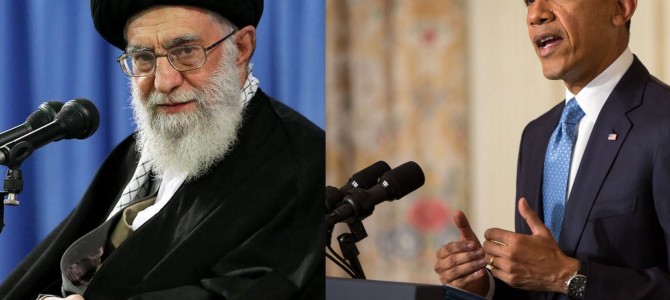Relax! It’s completely acceptable to accuse your political adversaries of being in league with America’s worst enemies. Just yesterday, in his speech defending the Iran deal, for example, our own president made the following claim:
It’s those hardliners chanting Death to America who have been most opposed to the deal … making common cause with the Republican caucus.
(APPLAUSE)
Now, you could argue that just because the positions of two dissimilar groups happen to temporarily intersect does not necessarily mean they share a “common cause” in any substantive or meaningful way. You could also argue that insinuating (or maybe, it’s just accusing) your political opponents of sharing a cause with America’s enemies is nothing more than a hyperbolic attack in search of applause. But let’s go with it for a minute, anyway. Because working within the president’s own logical parameters, it’d be fair to say that the ruling regime in Iran has made common cause with Barack Obama.
You know, guys like this:
This barbaric, wolflike & infanticidal regime of #Israel which spares no crime has no cure but to be annihilated. 7/23/14 #HandsOffAlAqsa
— Khamenei.ir (@khamenei_ir) November 8, 2014
It was back on July 18, a few days after the deal was announced, that we read this report:
In a speech at a Tehran mosque punctuated by chants of ‘Death to America’ and ‘Death to Israel’, Khamenei said he wanted politicians to examine the agreement to ensure national interests were preserved, as Iran would not allow the disruption of its revolutionary principles or defensive abilities.
Iran’s Supreme Leader, Ayatollah Khamenei, went on to endorse the deal that Obama claims is in America’s best interests. Now, Obama and Khamenei have made common cause, right? Maybe Obama doesn’t consider Khamenei despotic enough to be a labeled a “hardliner”—you can make up your own mind and peruse a translated copy his new book, “Palestine,” which offers various ways to attack both United States and Israel. Or perhaps Obama is unaware that many hardliners chanting “Death to America” aren’t opposed to this deal at all.
But there’s a reason why Obama’s defense of this deal, his attack on the patriotism of his domestic political opponents and his denigration of the American political process was telecast live to the Iranian people:
It’s stunning that the Iranian TV is airing the #ObamaAtAU live now. millions watching..powerful defence of #Irandeal pic.twitter.com/H2WstmPP33
— Omid Memarian (@Omid_M) August 5, 2015
Maybe the Islamic regime sees “common cause” with Obama, since he’s releasing $100 billion (in some stories, it’s $50 billion; in others, $150 billion) that will strengthen its economic position and allow it to expand funding for proxies of terror—all outcomes the president himself acknowledges. “Iran supports terrorist organizations like Hezbollah,” Obama admitted in his speech. “It supports proxy groups that threaten our interests and the interests of our allies, including proxy groups who killed our troops in Iraq.”
As Khamenei, Obama’s caucusing partner, also declared, his country “will never stop supporting our friends in the region and the people of Palestine [sic], Yemen, Syria, Iraq, Bahrain and Lebanon. Even after this deal our policy towards the arrogant U.S. will not change.”
Did anyone ask him to stop supplementing these “friends” during the negotiations? It seems doubtful, since Khamenei has had little to worry about when it comes to Obama. Let’s not forget that the president was basically a spectator when the ordinary Iranian people he now pretends to speak for took to the streets in June of 2009. Hundreds of those protestors were slaughtered by hardliners and not-so-hardliners, but unlike the active role Obama took in bringing the Muslim Brotherhood to power in Egypt, then he offered little even in the way of moral support.
Obama has already accused the opposition of being unduly influenced by the shekels. Many of the president’s fans have argued that opposition was close to sedition and should be punishable by law (maybe we do have more in common with the Islamic Republic than we think). It’s also worth noting that though the Bush administration said many stupid things after 9/11, I can’t recall it ever offering a remark so directly accusing domestic political opponents of aiding the enemy. I mean, imagine the fallout if George Bush had claimed that Democrats “were caucusing with Saddam Hussein” when opposing the Iraq war resolution? But even if I’m mistaken, and even if Bush officials did the same, shouldn’t liberals be the first to condemn ugly rhetorical attacks that question the patriotism of those in dissent? Of course not.









